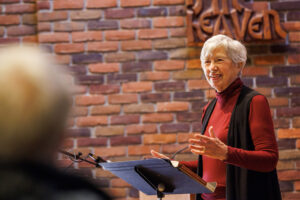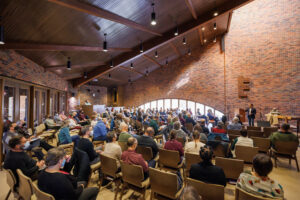By Heather Grennan Gary
View videos of the conference’s plenary sessions: ambs.edu/pastorsandleaders

At the Feb. 21–24 Pastors & Leaders | Deep Faith 2022 conference, Eleanor Kreider, MMus, a theologian, church musician and retired missionary from Elkhart, led daily teaching sessions on practices and characteristics of the Early Church. (Credit: Peter Ringenberg)
ELKHART, Indiana (Anabaptist Mennonite Biblical Seminary/Mennonite Church USA) — It’s been a rough two years for pastors and church leaders. During the early weeks of the COVID-19 lockdown, they scrambled to organize online worship services. As the pandemic progressed, they provided pastoral support for church members who were sick and those who lost loved ones. They contended with conflicts over masks and vaccines and handled financial and spiritual crises. And more than ever before, they walked with their congregations through uncertainties, tragedies, trauma and grief.
Organizers of Pastors & Leaders | Deep Faith 2022, a joint conference of Anabaptist Mennonite Biblical Seminary and Mennonite Church USA Faith Formation, chose the theme “Formed in the Wilderness, Leading in Hope” to address these challenges. Pastors and church leaders from across the United States and Canada participated in the Feb. 21–24 conference, with 141 in attendance on the AMBS campus in Elkhart, Indiana, and 64 participating online.
Sibonokuhle Ncube, PhD, a social justice advocate, development management and peace practitioner, and AMBS Master of Divinity student from Bulawayo, Zimbabwe, set the tone for the conference in her opening sermon on Monday evening. The wilderness, Ncube said, “could be physical ecological space or a metaphor for either self-initiated or externally initiated hard times of trial and testing.” In the wilderness of the pandemic, she said, “church leaders have been feeling the pressure. It has been direct. It has hit the soft underbelly of every community. The epicenter did not spare the church.”
Ncube noted how in the Scriptures, wilderness “offered space for spiritual formation, character shaping, reputation shaping or clarification of prophetic vision” for Abraham, Hagar, Moses, Miriam and for Israel.
“Since our situation is foreshadowed in theirs, we are encouraged to sing the praises of God, the benefactor,” she said, and pointed to Psalm 107 as a model for handling trouble in the wilderness. Ncube noted that the suffering and struggles fomented by the added layer of the pandemic have challenged the church to develop mature patience that anchors its hope on God’s lovingkindness as suggested by Psalm 107 and as reflected in the many encounters where God reveals God’s self or is given a name when God’s people face challenges.
“We are invited to imitation — crying to the Lord in our trouble because God never fails to deliver God’s beloved from distress! We are invited to see where God is leading — an invitation to mindfulness and attentiveness because there is a destination, and every trouble has an expiration date, hallelujah!”
Conference participants engaged the theme in several ways each day. Eleanor Kreider, MMus, a theologian, church musician and retired missionary from Elkhart, led daily teaching sessions that drew insights from the book The Patient Ferment of the Early Church: The Improbable Rise of Christianity in the Roman Empire (Baker Academic, 2016), written by her late husband, Alan Kreider, PhD, Professor Emeritus of Church History and Mission at AMBS.
Eleanor Kreider offered reflections on the question “What is the good of patience?”; on the statement “Christians are made, not born”; and on the image of Christians in third-century Syria who called themselves “Wise Doves,” referring to the importance of peacemaking in their worship. Like Ncube, she drew connections between pastors and church leaders of today and their spiritual ancestors.
“How is it possible to endure, to persist in a time of persecution?” Kreider asked in her reflection on “What is the good of patience?”
“The early Christian teachers pointed to Jesus as the exemplar of patience,” she said. “They were saying that Christians needed to have a strong, disciplined stance of life that would make it possible to cope with difficult, dangerous and uncertain circumstances. Patience is hope with muscle.”
In her reflection on Tertullian’s statement that “Christians are made, not born,” she said early Christians used the image of a wrestling school to describe the process of becoming Christian.
“Today, we might use the image of a recovery group,” Kreider said. “You have to get a sponsor and learn the skills; you have to practice them. You have to struggle and learn to lay aside the old ways.”
“Practicing a lifestyle is important for the individual, but it’s not enough,” she added, going on to describe a third-century document called the “Apostolic Tradition” that Alan Kreider detailed in Patient Ferment. It explains four stages in becoming Christian: (1) attraction to and friendship with a Christian person who introduces the seeker to a leader in the church and becomes a sponsor; (2) learning to behave as a Christian by following Jesus’ teaching and doing deeds of mercy with the congregation; (3) learning the “rule of faith” of the church; and (4) final preparation for the rite of initiation (baptism).
“The candidate sees that not only she but also many others are involved in making her a Christian — the sponsor, the congregation and especially the Holy Spirit,” Kreider said. “God makes her a Christian.”
Each of Kreider’s reflections was followed by two responses by church leaders in different ministry contexts. Nekeisha Alayna Alexis (MA 2008; Administrative Faculty) and Caley Ortman (MDiv 2017) spoke about the good of patience; Mark Tiessen-Dyck (MDiv 2011) and Moriah Hurst (MDiv 2008) spoke about the process of making Christians; and Madeline Maldonado (current MDiv student) and Matt Troyer-Miller (MDiv 2021) spoke about congregational life and worship.
“The respondents brought an immediacy and emotional depth to their presentations,” said conference co-planner Shana Peachey Boshart, Faith Formation Minister for Mennonite Education Agency. “In their reflections, we heard the heart cries of leaders who are seeking answers and finding hope in today’s wilderness. I think conference participants also heard their own experiences, trials and hopes expressed.”
Tom Yoder Neufeld, Professor Emeritus of Religious Studies and Theological Studies at Conrad Grebel University College in Waterloo, Ontario, led a Bible study each morning of the conference. He tied together the themes of wilderness, patience, formation and hope with a focus on the Letter to the Hebrews, which he described as a sermon preached to believers living in the late first-century Roman “wilderness.” He described these recipients of the letter as experiencing “fatigue and loss of confidence” and the author as “a preacher delivering a sermon” that offered listeners assurance, warning, comfort, encouragement and exhortation in their wilderness wandering.
On the final morning of the conference, participants gathered shortly after the news broke that Russia had invaded Ukraine. Yoder Neufeld acknowledged this new wilderness at the beginning of his talk, saying, “The more the wilderness closes in around us, the more that wilderness becomes experiential for us, the more daunting the whole notion of leading in hope becomes. If we’re being honest, we are often as, or more, perplexed and disheartened than those we are to lead in dangerous times.”
He continued with his prepared talk, citing Hebrews 13:17 — “Let them do their work with joy and not with sighing” — and added, “I would like us to come away from these three Bible studies — in fact, from this whole conference — filled with joy because of the hope that has been set before us and because of the high calling bestowed upon us as partners with Christ in the great task of leading in hope.”

Rolando Sosa Granados, a pastor at Piedra Viva Mennonite Church in Elkhart and a therapist for children and adolescents, gave the sending sermon at the Feb. 21–24 Pastors & Leaders | Deep Faith 2022 conference. (Credit: Peter Ringenberg)
Rolando Sosa Granados (MDiv 2010), a pastor at Piedra Viva Mennonite Church in Elkhart and a therapist for children and adolescents, based his sending sermon on Jeremiah 1:4-10.
“God has promised you that when you go through the desert, when you go through difficulties, he will be there for you,” he said. “Why? Because he chose you and he is faithful.”
Sosa Granados spoke about the dangers of clericalism while also specifying how pastors and church leaders are to live out their responsibilities as priest, prophet and king. They must have a compassionate heart, communicate the feelings of God to the people and lead the people from spiritual battle to victory. “We’ve been chosen to serve our beloved brothers and sisters, just like Christ served us,” he said.
Workshops on topics related to the conference’s theme as well as other faith formation practices also were a significant part of the conference, with 23 in-person and 10 virtual workshop options available to participants.
Conference co-planner Jewel Gingerich Longenecker, PhD, AMBS Dean of Lifelong Learning, felt the conference did what she most hoped it would do.
“I was deeply gratified by what felt like attendees letting out a collective sigh, drinking in deeply, and truly being strengthened for ongoing ministry,” she said. “As one participant told us, it was ‘just exactly what pastors and other church leaders need at this time — a place to unburden one’s soul, reclaim our Scriptures and tradition, and look forward with hope.’ Thanks be to God!”
Videos of the featured conference sessions are available online at ambs.edu/pastorsandleaders.
Collaborating to support theological thought leaders
This was the second joint conference of Pastors & Leaders and Deep Faith; the first one was held in early March 2020. Both AMBS and Mennonite Church USA were among the sponsors of the original Deep Faith conference, which was planned by an ad hoc group of faith formation leaders from Mennonite Church USA and Mennonite Church Canada and was held at AMBS in October 2016. (AMBS is a seminary of Mennonite Church USA and Mennonite Church Canada.)
Pastors & Leaders 2023 will be held Feb. 13–16.
Mennonite Church USA is the largest Mennonite denomination in the United States with 16 conferences, approximately 530 congregations and 62,000 members. An Anabaptist Christian denomination, MC USA is part of Mennonite World Conference, a global faith family that includes churches in 58 countries. It has offices in Elkhart, Indiana, and Newton, Kansas. mennoniteUSA.org
Located in Elkhart, Indiana, Anabaptist Mennonite Biblical Seminary is a learning community with an Anabaptist vision, offering theological education for learners both on campus and at a distance, including a wide array of lifelong learning programs — all with the goal of educating followers of Jesus Christ to be leaders for God’s reconciling mission in the world. ambs.edu

